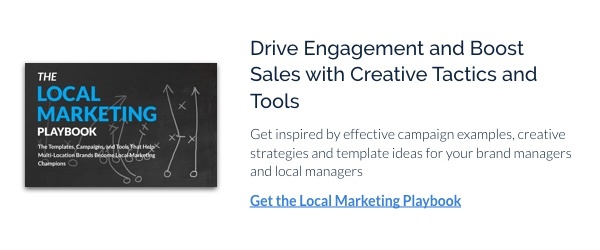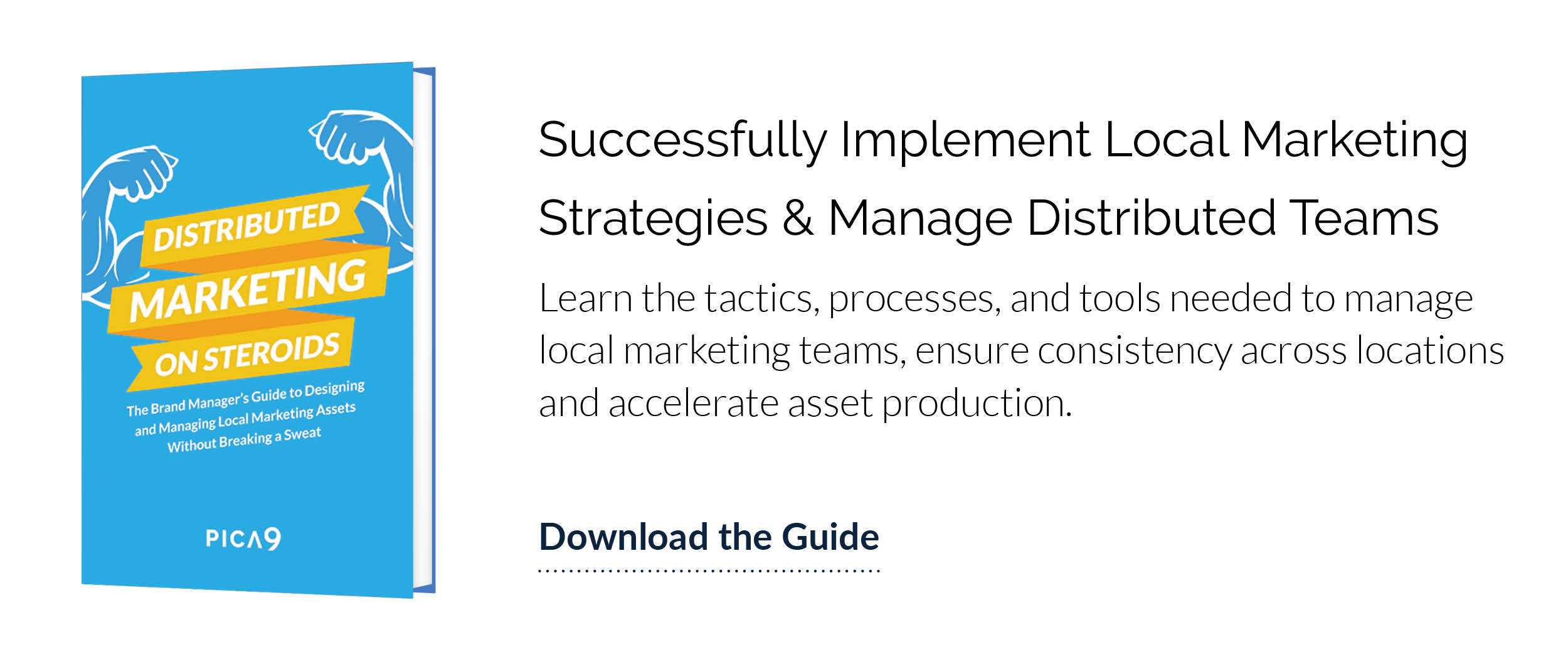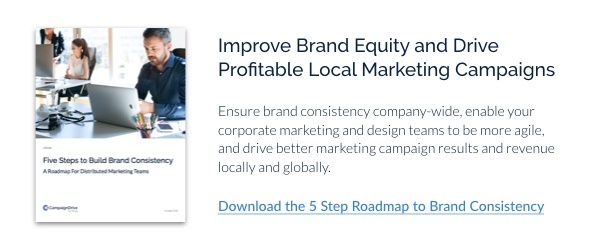The cost of non-compliance is always high, and most likely much higher than you think. Recent legal action by the U.S. Federal Trade Commission (FTC) against firms found guilty of deceiving consumers include settlements in the millions.
In addition to legal fees and settlements, compliance issues can erode consumer trust and damage your brand’s equity. Depending on the impact of a compliance issue, your brand may not recover from the negative press, the drop in consumer sentiment, and the related drop in sales.
“A vast array of laws and regulations governs how every organization is allowed to market its products and services,” writes Thomson Reuters. [1] While specific requirements can vary by industry, brand marketing managers hold some responsibility for ensuring that advertising is never deceptive or unfair, and that all necessary criteria around brand communications via phone, email and digital platforms is followed.
Distributed brands face more difficult challenges than other organizations when it comes to complying with advertising legislation. Brand managers tasked with supporting the execution of local advertising for a large number of dealerships, franchisees, or local representatives, may struggle with limited resources and oversight at the local level. Although risk management strategies are often complex affairs designed in conjunction with legal counsel, when it comes to implementing them marketers often find that the most valuable tool for driving compliant local advertising is improved communications.
How to Talk About Distributed Marketing Compliance
Internal communications with local marketers is a highly effective way for brand managers to educate local marketing representatives. As a distributed brand manager, you understand that communicating with local stakeholders can be challenging. In many cases, the local marketers are geographically far from the home office. Franchisees and dealerships are also focused on business goals that are narrower than the brand’s objectives and can, therefore, be misaligned with them.
Perhaps most importantly, miscommunications around compliant advertising end up happening because of a simple lack of resources. Local marketing representatives don’t have the same plethora of tools and techniques that the brand management team has at head office. These resources may include access to legal counsel and internal subject matter experts for compliance.
In other cases, local marketers may struggle to comply with advertising legislation due to a lack of educational or technical resources. Finally, local marketing affiliates just don’t have the same level of experience with what counts as legally-compliant communications, unlike a brand management team that basically practices that approach every day.
Unless multi-location brand managers are able to secure the resources for ensuring local representatives are fully-compliant with their advertising, a solid set of strategies and tools for ongoing dialogue will be critical. For many distributed organizations, a combination of policies, procedures, education, and sheer willpower is the most effective way to ensure that your local representatives are able to execute localized marketing within the boundaries of brand guidelines.
Poor Distributed Brand Compliance Leads to Bad Apple Syndrome
Until your local representatives can access, understand, and implement rules for compliant advertising, your entire brand is at risk. While your franchise or dealership agreement may transfer responsibility for non-compliant advertising to the local level, the risks of bad apple syndrome are all too real. A single franchisee’s mistake can impact the entire brand negatively. Customers often don't distinguish between brand and individual location; and negative press around compliance issues can erode consumer trust even further, damaging your entire organization.
There are many ways to approach internal communications around compliance with your local affiliates - some more daunting than others. You could require legal counsel to review every Tweet or menu before it’s distributed at the local level - a highly time-consuming task, and expensive too. Or, you could impose fines for non-compliance.
While the above two options of intensive reviews and fines are likely to result in better compliance, endless legal reviews for thousands of assets from thousands of local affiliates is not scalable, and slapping on fines will erode the relationship between the brand and locals. Instead of focusing on repercussions for local marketers who fall out of brand compliance, shift your focus to education and prevention.
Encourage locals to comply by providing examples of other locals creating great advertising, and reward instead of penalizing. By consistently relaying the type of advertising and assets that a local marketer should be employing, and offering support and feedback to local ideas and ideations, the more likely you will see on-brand executions. Communication is at the core of this process.
8 Communication Tools and Tactics for Better Local Marketing Compliance
1. Adopt the Local Perspective
The baseline of your strategy for communicating about the importance of advertising compliance should include an understanding of the local marketer’s perspective. Your brand can’t expect local marketers to adopt a new chat platform for discussing each asset with a brand representative. Remember, your local marketers are busy, and have competing priorities.
By making the process easy for the local marketer, and setting clear guidelines for how they should approach compliant advertising, as well as clear avenues for feedback, you help ensure their success without overburdening them.
Additionally, think about how you can adopt their perspective. Try to understand what problems they might be facing day-to-day. Brand managers can do this by interviewing local affiliates and asking them what their typical day entails. With this information, you will better understand how to integrate a communication strategy that works for both of you.
2. Host Local Marketer Conferences
Annual conferences for your dealerships, franchisees, or other representatives are an important opportunity for providing in-depth insights into compliance best practices, risk management and other topics that will make your local marketers better at what they do. By enlisting subject matter experts to provide sessions and keynotes on compliance, and other need-to-know topics, you can reinforce the importance of compliant local advertising.
3. Create Local Support Groups
Sponsoring in-person, or virtual, meetings for franchisees and dealers in the same region provides valuable access to a network of like-minded professionals. Ideally, your local marketers should use these sessions to share ideas, experiences, and advice with their peers. By scheduling meetups that include both local marketers and a representative from headquarters, you can reiterate corporate messaging around advertising compliance topics.
4. Improve Your Operating Manual
Your local operating manual should act as a comprehensive blueprint for the basics of compliant advertising, including how locals can achieve fair and honest advertising, required disclosures and internal resources to help with compliance when needed.
While brand management teams aren't usually responsible for the writing up the entire operating manual, working to include marketing compliance-related content is important. Marketing leaders and legal counsel should collaborate with the brand management team to ensure the operation manual’s coverage of marketing-specific compliance information is complete and up-to-date.
5. Perform Brand Audits
Auditing local marketing execution can be time-consuming, and may not be something that your brand can do every month, or even quarter. For brands with the resources and processes in place to provide individual feedback to local marketers, a culture of active dialogue around compliance is extremely beneficial. These brand audits may include on-site visits to evaluate print advertising, reviews of digital media, or an analysis of marketing output using a dedicated technology platform like a Distributed Digital Asset Management (DAM) system.
Learn more: How To Conduct A Brand Audit
6. Provide Role Models
Examples help add local context to your brand management team’s communications about how to comply with brand guidelines or legal requirements. By constantly working to showcase effective and not-so-effective local marketing, you can provide examples of local compliance and add depth to your education efforts.
Your weekly or monthly franchisee newsletter should highlight exceptional examples of local compliance. Use this as an opportunity to spotlight specific kinds of non-compliance as well to help your locals avoid risky advertising mistakes.
7. Archive "Best-Of" Examples
As your brand management team identifies examples of brand compliance, collect successful local executions for an archived “Hall of Fame,” which can be digitally archived via DAM or another technology. These real-life examples can be reused and recycled for compliance trainings, operating manuals, and other local marketer communication efforts.
8. Share Compliance Insights Regularly
Brand managers should treat local affiliates like a special kind of customer - one that needs to be given as many opportunities to engage as possible. Relying on a single tool to communicate, like email, creates the potential for missed messages and increases the risk of local representatives falling out of the loop on best practices. By communicating a single message across many platforms, your brand management team can increase the chances that all of your dealers or franchisees are on the same page.
These can include:
1. Email newsletters
2. Internal Social Media Networks
3. Personal Communications from Regional Marketing Managers
4. Letters and Mailed Communications
5. Intranet announcements
Communication: The Solution to Local Marketer Non-Compliance
Local marketers are busy. As a brand manager, the foundation of your compliance communication strategy is to make it easy for your franchisees and dealers to access need-to-know information on how to prevent costly and risky compliance issues related to marketing compliance. By communicating consistently, using a number of platforms, and providing plenty of examples, your organization initiates an ongoing dialogue around compliant local marketing.
While a communication strategy around compliance is a never-ending effort, brand managers are likely to realize they’ve maximized their efforts when they see more examples of compliant advertising in the field. Through audits of your locals digital media, on-site visits, and remote audits via a DAM tool, your brand can work to ensure that your communications tools and tactics for distributed marketing compliance are optimized.
For more insight into how brand managers at leading organizations like Melting Pot, Marriott, and Polaris support local marketing success check out the free eBook The Local Marketing Playbook: The Templates, Campaigns and Tools That Help Multi-Location Brands Become Local Marketing Champions
https://risk.thomsonreuters.com/en/compliance-training-courses/marketing-compliance.html






